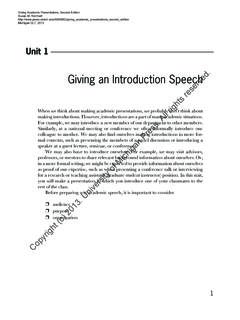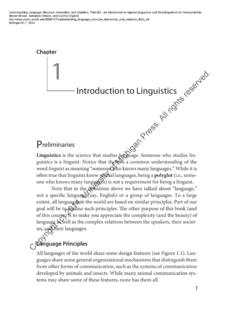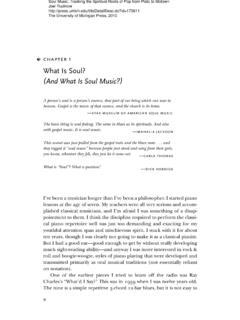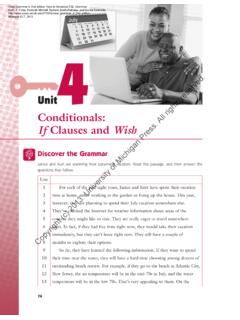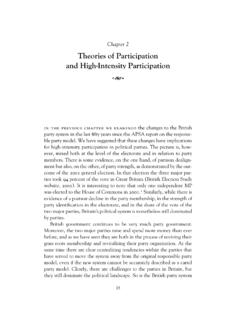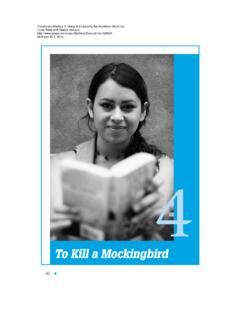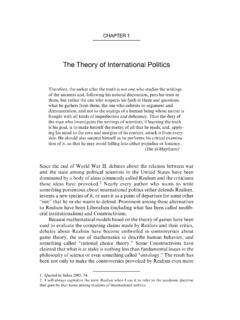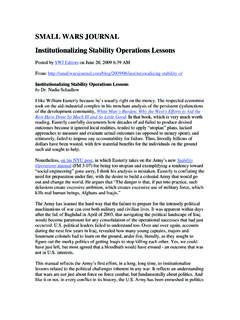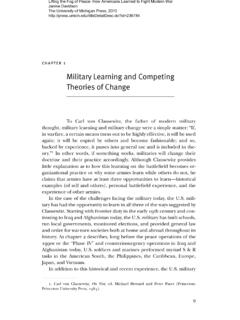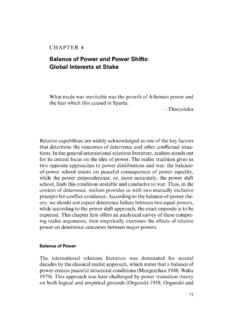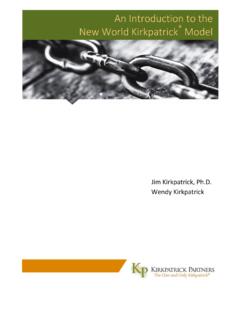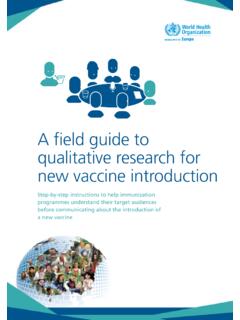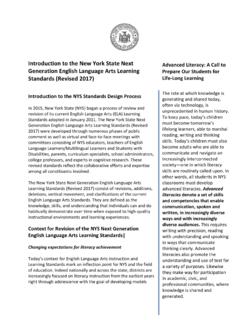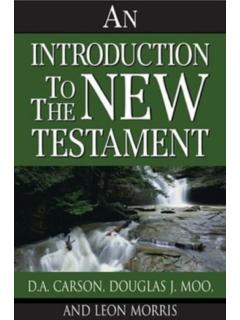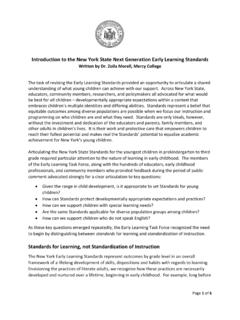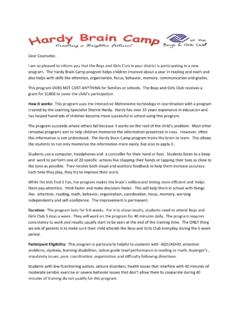Transcription of Introduction: New Directions for ESP Research
1 1 introduction : New Directions for ESP ResearchAnn M. Johns, Brian Paltridge, and Diane BelcherEnglish for Specific Purposes (ESP) has an established tradition that has undoubtedly provided leadership, as well as an intellectual nudge, for what is still generally called General English or, more disparagingly, English for No Obvious Reason. As John Swales demonstrated in his 1988 ESP history (Episodes), developing an appropriate pedagogy for a specific group of learners has always been the goal of ESP practitioners. Studying language, discourses, and contexts of use as well as student needs, in the broadest sense and then applying these findings to the pedagogical practices, is what distinguishes ESP from other branches of applied linguis-tics and language teaching. In a more recent historical overview, Belcher (2004) noted that:Unlike other pedagogical approaches, which may be less specific needs based and more theory-driven, ESP pedagogy places heavy demands on its practitioners to collect empirical needs-assessment data, to create or adapt materials to meet specific needs identified, and to cope with often unfamiliar subject matter and even language (p.)
2 166)In Episodes of ESP, Swales marked the modern beginnings of ESP Research with s some measurable characteristics of modern scientific prose (1988, pp. 1 16), which Swales spoke of as the first clear demon-stration that the descriptive techniques of Modern Linguistics .. could be successfully applied to the language of science and technology (p. 14). Swales remaining fourteen episodes contain two famous examples of New Directions in English for Specific Purposes Research Diane Belcher, Ann M. Johns, and Brian Paltridge Michigan ELT, 2011 Introduction2 ESP Research : Lackstrom, Selinker, and Trimble s Grammar and Techni-cal English (1972), and Tarone, Dwyer, Gillette, and Icke, On the use of the passive in astrophysics papers (1981), each of which represents a turn-ing point in the Research literature and the pedagogies that drew from it.
3 Tarone et al., the final episode in the volume, is a portent for the future, as the authors of this article, one of whom was a content specialist (an important addition), state their purposes: We .. undertook to examine in more detail the frequency of occur-rence of the active and passive forms in two journal papers in the field of astrophysics, and to investigate in particular the rhetorical function of the passive in these texts (Swales, 1988, p. 192, italics added). In this article, we read a basic argument that continues to be an ESP Research focus: that to best understand how language is used, we must examine it within its context. Also basic to this final episode is the empha-sis on rhetorical function, a concept that had appeared somewhat earlier in the Washington School literature (see, , Selinker, Tarone, & Hanzeli, 1981) and continues to be a central issue in our Research agendas.
4 It is important to note, however, that the other selected episodes in Episodes are either discussion papers relating to teaching, such as Allan and Widdowson s Teaching the communicative use of English (1974) and Hutchinson & Waters ESP at the crossroads ; papers that deal directly with curricula, such as Ewer and Hughes-Davies Further notes on developing an English programme for students of science and technology (1971 72) and Phillips & Shettlesworth s How to arm your students: A consideration of two approaches to providing materials for ESP (1978); or actual teach-ing materials from textbooks, such as Swales own Writing Scientific English (1971) and Bates and Dudley-Evans Nucleus General Science. Thus, Swales, as well as those of us who have written about ESP his-tory more recently ( , Belcher, 2009; Johns & Price-Machado, 2001; Pal-tridge, 2009), demonstrates that Research and pedagogy are interwoven: our Research generally has pedagogical purposes and our pedagogical prac-tices are directed by the Research completed within a specified context.
5 Much has occurred, both within and outside of ESP, to affect the com-plexity and evolution of ESP Research since Swales 1988 Episodes. Influ-enced by advances in technology, studies into language within communities New Directions in English for Specific Purposes Research Diane Belcher, Ann M. Johns, and Brian Paltridge Michigan ELT, 2011 Introduction3of practice have evolved and expanded through corpus linguistics to enable the classification of massive collections of linguistic data, an approach rep-resented in this volume in chapters by Lynne Flowerdew (10) and by Kan-dil and Belcher (11). Whereas at one time Research was devoted almost exclusively to specific language elements ( , the passive), the study of discourses, particularly influenced by Swales (1990), has drawn from the concept of genre (see Hyland, 2004; Paltridge, 2001); and, as Tardy (Chap-ter 7) shows in this volume, genre analysis studies have become increas-ingly multi-methodological.
6 John Flowerdew, in his chapter (6), points out that this work has taken place as contrasting stances on genre theory have become more , the Research into language and discourses/genres is the most evolved and sophisticated in ESP; however, other areas of interest basic to effective classroom practices have also been expanding. As Hyland s chapter (1) and that of Paltridge and Wang (2) show, both disciplinary and national contexts are highly productive topics for study, and Mauranen argues, in her chapter (5), that Research into the English language within EFL contexts, though in its infancy, is vital to our understanding of global language Long, in his 2005 collection, reiterated the rationale for needs analysis and needs analysis Research (pp. 1 18), the raison d tre for ESP studies.
7 Long notes that Research in applied linguistics has become increas-ingly varied and professional, thus .. ( Research findings) cast doubt on the validity of synthetic, especially grammatical, syllabuses, and have been partially responsible for the miscellany of syllabus types .. now on the table (p. 3). Influenced by our own colleagues studies and by other work in applied linguistics ( , second language acquisition, critical discourse analysis, and critical ethnography), ESP researchers have begun to consider student identity as central to needs analysis (Belcher & Lukkarila, this volume, 4). Another approach, still in its infancy among ESP researchers, is critical ethnography, as applied to specific settings (Sue Starfield, this volume, 8) and to researcher self-awareness during a needs analysis project (Johns and Makalela, this volume, 9).
8 As can be seen, the fundamental arguments in this volume are that ESP researchers must use all of the tools at hand to systematically assess the needs, identities, and issues faced by learners and the language and New Directions in English for Specific Purposes Research Diane Belcher, Ann M. Johns, and Brian Paltridge Michigan ELT, 2011 Introduction4discourses of their contexts as well as the frames brought to the context by the researchers themselves. In addition, we must continue to develop the convergence between Research , teaching, and learning (Cheng, this vol-ume, Chapter 3), as our profession , D. (2004). Trends in teaching English for Specific Purposes. Annual Review of Applied Linguistics, 165 , D. (2009). What ESP is and can be: An introduction . In D. Belcher (Ed.)
9 , English for Specific Purposes: Theory and practice (pp. 1 20). Ann Arbor: University of Michigan Press. Hyland, K. (2004). Genre and second language writing. Ann Arbor: University of Michi-gan , , & Price-Machado, D. (2001). English for Specific Purposes (ESP): Tailoring courses to student needs and to the outside world. In M. Celce- Murcia (Ed.), Teaching English as a second or foreign language (3rd ed). Boston: Heinle & Heinle. Long, M. (2005). Second language needs analysis. Cambridge, : Cambridge Uni-versity , B. (2001). Genre and the language learning classroom. Ann Arbor: University of Michigan Press. Paltridge, B. (2009). Where have we come from and where are we now? In D. Belcher (Ed.), English for Specific Purposes: Theory and practice (pp. 289 296). Ann Arbor: University of Michigan Press.
10 Selinker, L., Tarone, E., & Hanzeli, V. (Eds.). (1981). English for academic and techni-cal purposes: Studies in honor of Louis Trimble. Rowley, MA: Newbury , (1988). Episodes in ESP: A source and reference book on the development of English for Science and Technology. New York: Prentice-Hall. Swales, (1990). Genre analysis. Cambridge, : Cambridge University Press. New Directions in English for Specific Purposes Research Diane Belcher, Ann M. Johns, and Brian Paltridge Michigan ELT, 2011
